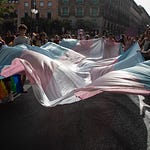[This blog will always be free to read, but it’s also how I pay my bills. So, if you like what you read, please consider a paid subscription. And yes, I do speaking engagements.]
There are two highly anticipated films being released this week.
One of them is about an iconic and controversial public figure from the 20th century, their influence on how we perceive ourselves and each other, and how they reflect the enduring cognitive dissonance between our stated values as a society and the reality of our myriad systemic hypocrisies.
The other movie is about J. Robert Oppenheimer, the father of the atomic bomb.
Greta Gerwig’s “Barbie” is somehow both the perfect summer flick—hilarious and fun as hell—and an unflinching critique of a universal brand that has sold more than a billion dolls since its launch in 1959.
This is the fourth directorial effort from Gerwig, who received consecutive Oscar screenplay nominations for her two previous films, “Little Women” (2019) and “Lady Bird” (2017), the latter of which garnered her a directing nod, only the fifth woman to be in that category.
She is also an exceptional actor. Her performance in “Frances Ha” (2014)—one of my favorites—was widely praised and led to a Golden Globe nod for Best Actress in a Comedy.
Gerwig does two things particularly well in her work: she makes us laugh, and she makes us think. It is no surprise then that “Barbie” feels like an especially potent trojan horse, beckoning us with well-earned laughter into a larger conversation on gender and how Barbie—the defining cultural symbol of high femme expression—has shaped that discourse over the past six decades.
Neither preachy nor pandering, Gerwig is searingly honest and admirably fair in the screenplay she co-wrote with longtime partner Noah Baumbach. Barbie, the iconic doll, is rendered here—played brilliantly by Margot Robbie—as neither saint nor villain. She is an ever-changing projection of social views that have amalgamated during her tenure at the top of the toy world.
Gerwig drills into that dynamic at the center of the film’s plot. Barbie, who is initially depicted in a montage of the Barbieworld utopia—a gorgeous Dreamhouse, a sexy Barbie Convertible, great friends, perpetual sunshine—is randomly confronted with thoughts of death and finds herself literally caught flat-footed. She consults with Weird Barbie—the iconoclast of Barbie Land, played pitch perfect by Kate McKinnon—who explains to her that these changes are from the outside world, the thoughts of a girl playing with her.
Barbie reluctantly sets out to find this girl in the real world and make things right, so she can get back to her daily utopia. She is joined by Ken (Ryan Gosling), who cannot perceive of himself as anything other than an extension of Barbie and the two are shocked to find that the real world is an inverse of gender power dynamics.
In Barbie Land, the Barbies run everything and the Kens (and poor Allan) are merely accessories, but in the real world, Ken discovers the fast-food-like joys of patriarchy in a hilarious sequence of scenes while Barbie contends with unbridled misogyny for the first time. Moreover, upon finding the young woman who played with her, she learns that Barbies are considered by many girls to be enablers of the patriarchy.
If this all seems like a lot, it’s a testament to Gerwig’s brilliance in putting it onscreen, in which zippy dialogue and clever sight gags in a visual feast acknowledge the nuances of Barbie’s complicated legacy without even a hint that we should give up on Barbie. On the contrary, Robbie imbues Barbie with such empathy and charm that it’s impossible not to root for her.
And yet, Gerwig doesn’t shy away from putting Mattel on blast, whom are depicted in the film as an all-male Board of Directors led by Will Ferrell, who humorously attempts to get Barbie out of the real world and back to Barbie Land.
Ferrell’s clumsy attempt to insist to Barbie that women are important to Mattel’s history while surrounded by his all-male colleagues is one of the funnier bits of dialogue in a flick packed with hilarious exchanges and zingers.
Many of those zingers and other thoughtful lines are delivered by an outstanding supporting cast: Rhea Perlman, Issa Rae, and Emma Mackey among them. I was quite delighted to see Hari Nef play one of the Barbies with substantial dialogue, and she is magnificent in this. Some fun cameos include Dua Lipa and John Cena as mermaids (ahem, excuse me, Cena is a “Kenmaid”).
Without giving anything away, I was particularly taken with America Ferrera’s performance as Gloria, an employee of Mattel and mom of the teen girl being sought out by Barbie. Ferrera is an outstanding generational bridge between contrasting views on Barbie, her character having a complicated nostalgia for the doll while her daughter rejects it.
But it’s Ferrera’s monologue on what it means to be a woman about two-thirds through the film that marks a standout moment. Honest, funny, and a bit depressing, the speech captures the essence of what makes Barbie’s legacy so uneven. It serves as an anchor for the story, forcing the viewer to confront some unhappy but necessary truths.
Again, what makes Gerwig’s vision so brilliant is in how the seriousness of the film’s discussion on gender neither washes out the fun nor is diminished by it. It’s a tightrope act that Gerwig walks with fantastic balance. The film wouldn’t be nearly as fun without her honest framing.
Gosling is especially a joy to watch. The Ultimate Himbo, after discovering patriarchy in the real world, Ken rushes back to Barbie Land to become something of a Jordan Peterson guru to the other Kens, except where Peterson has zero charm and is the dipshit’s idea of a smart man, Gosling is quite hilarious and charming in parodying him.
As Ken realizes that he has to define himself separate from Barbie and not treat her as the source of his self-worth and therapeutic needs—HINT HINT HINT—Barbie is realizing that she may want a lot more with her existence than what she’s always had.
Don’t worry: no spoilers, but the ending is particularly moving and well-written.
I’m going with my girlfriends to see it again on Saturday. We will all dress in hot pink and laugh at the biting humor. Then, we’ll probably get drinks and talk about Gerwig’s clever approach in unpacking the complexity of Barbie and the closing line of the movie, which alludes to how this whole conversation on gender and womanhood is based on a doll without a vagina.
“Barbie” is in theaters this Friday, July 21st. Four stars. Go see it.
Hi, I’m Charlotte Clymer, and this is Charlotte’s Web Thoughts, my Substack. It’s completely free to access and read, but it’s also how my bills! So, please do kindly consider upgrading to a paid subscription: just $7/month or save money with the $70/annual sub. You can also go way above and beyond by becoming a Lifetime Member at $250.














Share this post